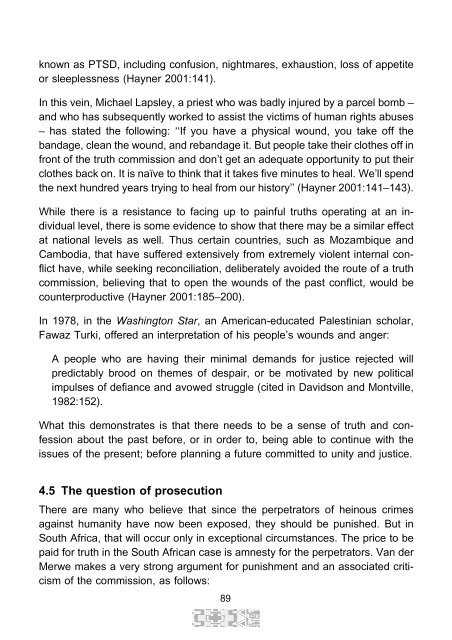AFRICANUS Vol 32 No 1 ISSN 0304-615X - University of South Africa
AFRICANUS Vol 32 No 1 ISSN 0304-615X - University of South Africa
AFRICANUS Vol 32 No 1 ISSN 0304-615X - University of South Africa
Create successful ePaper yourself
Turn your PDF publications into a flip-book with our unique Google optimized e-Paper software.
known as PTSD, including confusion, nightmares, exhaustion, loss <strong>of</strong> appetite<br />
or sleeplessness (Hayner 2001:141).<br />
In this vein, Michael Lapsley, a priest who was badly injured by a parcel bomb ±<br />
and who has subsequently worked to assist the victims <strong>of</strong> human rights abuses<br />
± has stated the following: ``If you have a physical wound, you take <strong>of</strong>f the<br />
bandage, clean the wound, and rebandage it. But people take their clothes <strong>of</strong>f in<br />
front <strong>of</strong> the truth commission and don't get an adequate opportunity to put their<br />
clothes back on. It is naõÈ ve to think that it takes five minutes to heal. We'll spend<br />
the next hundred years trying to heal from our history'' (Hayner 2001:141±143).<br />
While there is a resistance to facing up to painful truths operating at an individual<br />
level, there is some evidence to show that there may be a similar effect<br />
at national levels as well. Thus certain countries, such as Mozambique and<br />
Cambodia, that have suffered extensively from extremely violent internal conflict<br />
have, while seeking reconciliation, deliberately avoided the route <strong>of</strong> a truth<br />
commission, believing that to open the wounds <strong>of</strong> the past conflict, would be<br />
counterproductive (Hayner 2001:185±200).<br />
In 1978, in the Washington Star, an American-educated Palestinian scholar,<br />
Fawaz Turki, <strong>of</strong>fered an interpretation <strong>of</strong> his people's wounds and anger:<br />
A people who are having their minimal demands for justice rejected will<br />
predictably brood on themes <strong>of</strong> despair, or be motivated by new political<br />
impulses <strong>of</strong> defiance and avowed struggle (cited in Davidson and Montville,<br />
1982:152).<br />
What this demonstrates is that there needs to be a sense <strong>of</strong> truth and confession<br />
about the past before, or in order to, being able to continue with the<br />
issues <strong>of</strong> the present; before planning a future committed to unity and justice.<br />
4.5 The question <strong>of</strong> prosecution<br />
There are many who believe that since the perpetrators <strong>of</strong> heinous crimes<br />
against humanity have now been exposed, they should be punished. But in<br />
<strong>South</strong> <strong>Africa</strong>, that will occur only in exceptional circumstances. The price to be<br />
paid for truth in the <strong>South</strong> <strong>Africa</strong>n case is amnesty for the perpetrators. Van der<br />
Merwe makes a very strong argument for punishment and an associated criticism<br />
<strong>of</strong> the commission, as follows:<br />
89
















